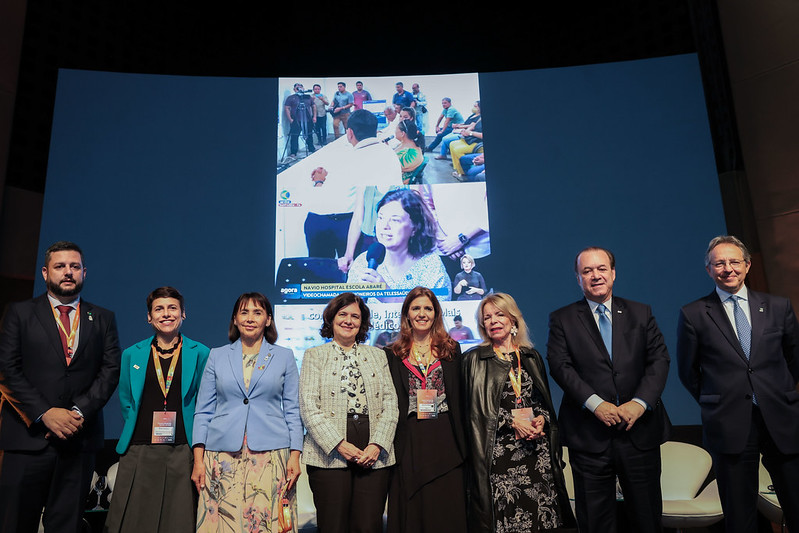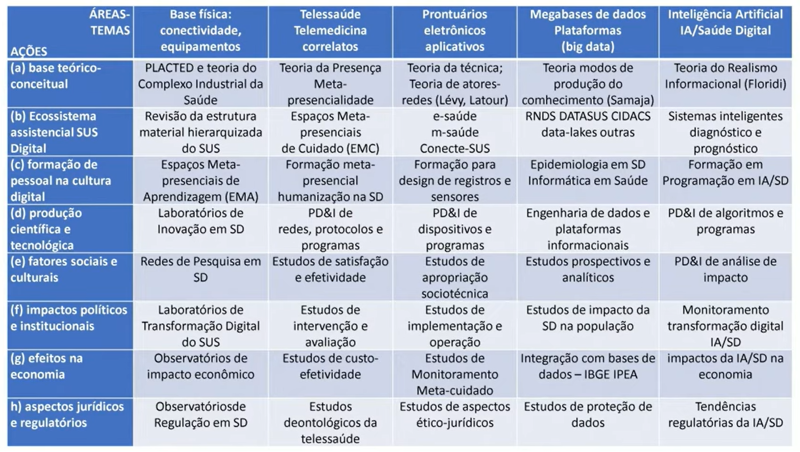Held on October 2nd and 3rd in São Paulo, the 1st International Symposium on Digital Transformation in the Brazilian Health System (SUS) had its program entirely dedicated to key themes in digital health that are currently challenging healthcare systems. Organized by the Ministry of Health of Brazil (MoH), through the new Secretariat of Information and Digital Health (SEIDIGI/MoH), the event took place in partnership with the Pan American Health Organization (PAHO) and the State Department of Health of São Paulo (SES-SP).
Under the leadership of Secretary Ana Estela Haddad (SEIDIGI/MoH), the symposium aimed to establish itself as a cutting-edge platform for presenting and exchanging successful experiences in SUS. According to Ana Estela Haddad, it is “an effective response to the rapid changes being imposed on healthcare systems, managers, and workers, by the evolution of information technologies and digital tools.”
To communicate the latest experiences of Digital Transformation in SUS, this 1st International Symposium featured the participation of 50 panelists, including administrators, researchers, and digital health experts, who shared different experiences in municipalities, states, educational institutions, research organizations, and institutions. The discussions were grouped into six thematic panels, including:
- Digital transformation of healthcare systems.
- Integrated experiences in telehealth.
- Data science and artificial intelligence.
- Models of interoperability architecture, such as the National Health Data Network (RNDS).
- Economic and Industrial Health Complex.
- Data protection and management of personal data.
On the first day, under the coordination of Secretary Ana Estela Haddad, the opening session featured the presence of ten authorities from the Ministry of Health, the Ministry of Management, the Brazilian Development Bank (BNDES), National Council of Health Secretaries (Conass), and the Brazilian Company for Hospital Services (Ebserh). The opening conference “Digital Transformation of Health Systems” included international lectures by Professor Rifat Atum from Harvard University and Dr. Masood Ahmed from the National Health Service of the United Kingdom (NHS), moderated by Adriano Massuda from the Getúlio Vargas Foundation.
The presentation by BIREME, delivered by Director Dr. João Paulo Souza in the “Telehealth in SUS” panel, highlighted the new functionalities being developed by the Center for applying artificial intelligence to “Second Formative Opinion” with the aim of infusing industry 4.0 attributes into the product. According to João Paulo Souza, “the future prospects being developed for the Second Formative Opinion Program demonstrate BIREME’s institutional commitment to continually incorporate new information technologies to improve the application of scientific knowledge in healthcare.”
A #BIREME mantém o compromisso de incorporar novas tecnologias da informação para melhorar a aplicação do conhecimento científico na saúde. O diretor João Paulo Souza compartilha perspectivas futuras para a #SegundaOpiniãoFormativa, com o @minsaude e os Núcleos de Telessaúde 🛜 pic.twitter.com/GhzfPjmMrs
— BIREME (@bireme) October 31, 2023
On the second day of the event, PAHO’s General Representative of in Brazil, Dr. Socorro Gross, participated in the opening session along with other authorities such as the Minister of Health of Brazil, Nísia Trindade, the President of the National Health Council, Fernando Pigatto, and the Secretary of Health of the State of São Paulo, Eleuses Paiva. Minister Nísia, the top health authority in the country, argued that “the application of scientific knowledge produced by academia should be incorporated into health policies, from management to care.”
In her speech, Dr. Socorro Gross mentioned some populations in the Americas “that are not yet digital,” indicating the opportunities observed by PAHO for knowledge exchange and successful experiences among countries in Latin America and the Caribbean, highlighting the relevance of Brazil in strengthening digital health in other healthcare systems.

To complete PAHO’s participation in the event, Dr. Marcelo D’Agostino, Chief of the Health Information Systems Unit at the Department of Evidence and Intelligence for Action in Heatlh (EIH/PAHO/WHO), participated in the panel on the Interoperability Architecture Model of the National Health Data Network (RNDS) with the presentation “Interoperability in health: myths versus reality.” Addressing the challenges posed for the cybersecurity of platforms and unique standards for information management, Marcelo D’Agostino also announced the recent approval, at the OPAS headquarters in Washington D.C., of the “Eight Guiding Principles for the Digital Transformation of the Health Sector” to support and inform the next development and work cycle in the Organization from 2024-2030.
The symposium’s closing had a special contribution from Naomar de Almeida Filho, a professor at the Institute of Collective Health at the Federal University of Bahia, who, at the request of Secretary Ana Estela Haddad, synthesized all the topics, problems, and opportunities brought by participants during the two-day event in a diagrammed table (figure below, in Portuguese).

More than 600 participants were present at the Rebouças Convention Center of the Faculty of Medicine at the University of São Paulo, and more than 4,000 registrations and online visits were recorded. The content shared with participants also included a display of 245 successful experiences of digital transformation in SUS, implemented in all regions of the country.
The symposium was supported by the Conass, the National Council of Municipal Health Secretaries (Conasems), the National Health Council (CNS), the Council of Municipal Health Secretaries of the State of São Paulo (Cosems/SP), the National Education and Research Network (RNP), the Brazilian Society of Health Informatics (SBIS), and the Brazilian Association of Telemedicine and Telehealth (ABTms).
Full presentations are available on the DATASUS YouTube channel (Day 1 and Day 2).
Links of interest:
Digital Transformation Toolkit. Artificial Intelligence. Policy overview | PAHO/WHO
Conheça as sete prioridades da Estratégia de Saúde Digital para o Brasil | MoH of Brazil